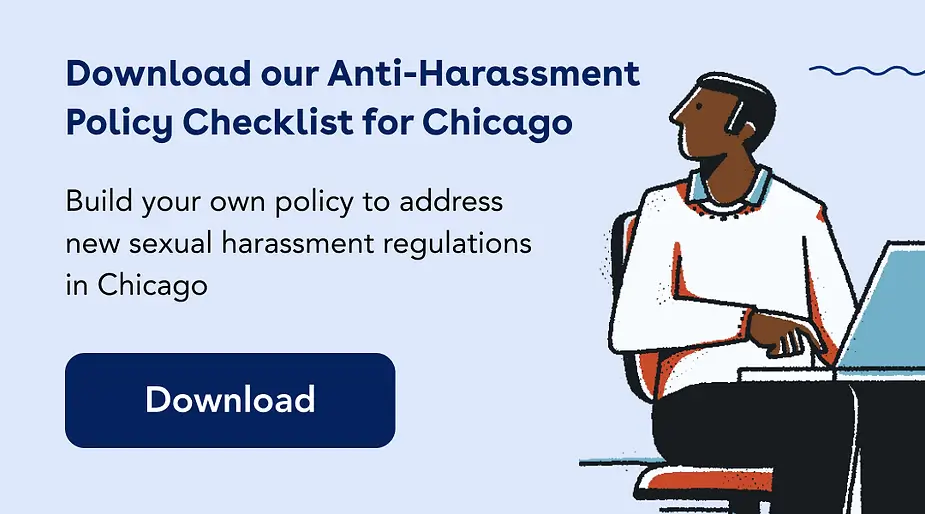A new Chicago ordinance means changes to local anti-harassment requirements – here's what you need to know and the easy way to satisfy them. (Spoiler alert: use Ethena's Bystander Intervention training).
In April, the Chicago City Council made several amendments to Chicago's sexual harassment training and policy requirements for employers. These new amendments go into effect on July 1, 2022, as part of a broader initiative to address gender-based violence and human trafficking.
Why is there a Chicago sexual harassment training requirement?
Chicago has recently made amendments to the city’s sexual harassment ordinance, which will:
- Strengthen its sexual harassment laws
- Increase its commitment to promoting zero tolerance of workplace violence and harassment
In a nutshell, these amendments include a requirement that employers provide annual sexual harassment training to employees. And these amendments will go a long way in helping companies prevent harassment in the workplace.
As a company that was founded on making effective harassment prevention training, we've put together a Bystander Intervention Training (one of the requirements within the amendment) to help you meet these requirements. It's a video course, broken up with thoughtful "check on learning" questions, and the videos are actually engaging. Check this snippet out:
3 takeaways on Chicago's sexual harassment law changes
With this recent announcement, you may be wondering what the new ordinance means for you and your team. So we’ve put together this post to highlight three main takeaways, and encourage you to read the full list of new requirements here.
1. Chicago’s new law enhances the definition of sexual harassment
There’s a common misconception that sexual harassment is only blatant and overt acts and behavior (such as unwanted sexual advances or when a manager requests sexual favors in exchange for a promotion). And while these incidents, unfortunately, do happen in workplaces, harassment can also be more subtle and covert and can occur in a number of very real instances in daily work life. (See: microaggressions.) For that reason, it’s important that sexual harassment be broadly and holistically defined to cover all types of unlawful harassment; that way, employees can be more equipped to identify and report workplace harassment.
As part of the recent amendments, the Chicago Human Rights Ordinance was expanded to add “(iii) sexual misconduct, which means any behavior of a sexual nature which also involves coercion, abuse of authority, or misuse of an individual’s employment position” to the definition of “sexual harassment”. The revised definition now reads:
“Sexual harassment” means any (i) unwelcome sexual advances or unwelcome conduct of a sexual nature; (ii) requests for sexual favors or conduct of a sexual nature when (1) submission to such conduct is made either explicitly or implicitly a term or condition of an individual’s employment;, or
(2) submission to or rejection of such conduct by an individual is used as the basis for any employment decision affecting the individual;, or
(3) such conduct has the purpose or effect of substantially interfering with an individual’s work performance or creating an intimidating, hostile, or offensive working environment; or (iii) sexual misconduct, which means any behavior of a sexual nature which also involves coercion, abuse of authority, or misuse of an individual’s employment position.
2. Chicago's sexual harassment law requires a written policy on sexual harassment
Having a clear and direct written policy on harassment can help set expectations and clearly communicate what your company considers acceptable conduct in the workplace. This is especially important for new hires, who are new to both your company and its practices. With these new amendments, companies that may not have had a written policy in the past will now need to prepare and circulate a written policy to employees within the first calendar week of their employment.
Whether you’re looking to write your first harassment policy, or planning to update your existing policy, it’s important to make sure you follow best practices for writing company policies such as:
- Make sure the policy is written clearly and concisely (in other words, avoid a 70-page PDF. . .)
- Make sure the policy is easily accessible. Your employees need to be able to access the policy if you want them to read it! In Ethena’s training platform, your team can quickly get to your company’s policies at any time with just a click.
Need some help drafting your own anti-harassment policy? Download our policy checklist below!

3. Chicago's law mandates annual sexual harassment training
It’s critical to invest in inclusive and comprehensive anti-harassment training that goes beyond a simple, “check-the-box” approach. (In fact, traditional anti-harassment training has been proven ineffective, and lackluster training can actually increase harassment.) Providing training content that is timely, relevant and accessible for learners and intuitive for administrators can directly contribute to a better workplace culture, and Ethena’s best-in-class training solution can help.
Starting on July 1, 2022, employers must provide annual training as follows:
- One hour of sexual harassment prevention training to all employees
- One additional hour of sexual harassment prevention training for supervisors/managers (for a total of two hours)
- One additional hour of Bystander Intervention Training for all employees
Since the new training requirements go into effect on July 1, 2022, employers will need to make sure their employees receive their first round of annual training by or before June 30, 2023.
Become compliant with Chicago's new harassment laws the easy way
Harassment training can be difficult to get right, and, unfortunately, there are many forms of training that just aren’t effective at preventing harassment. In fact, the EEOC has noted that “much of the training done over the last 30 years has not worked as a prevention tool – it's been too focused on simply avoiding legal liability.”
At Ethena, we’ve designed a training solution with state and local regulations top of mind, and have created training content that is both engaging and educational. Our training covers the topics required by several state and local anti-harassment laws, including Chicago, as well as states like Illinois, California and New York, to name a few.
In fact, in 2021, learners who completed Ethena’s Harassment Prevention training reported a 61% increase in confidence when intervening on behalf of a colleague.
If you are interested in meeting Chicago’s new sexual harassment training requirements using Ethena’s modern training approach, request a sample of our Harassment Prevention training today, or if you're ready to dive into the details, let's talk.
This communication does not constitute legal advice and is for general informational purposes only. The information in this communication may not be up-to-date, and nothing in this communication should be used as a substitute for advice from your attorneys or other professional advisors. Ethena does not assume any liability for reliance on the information provided herein.










